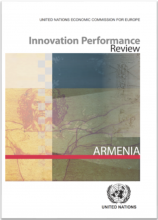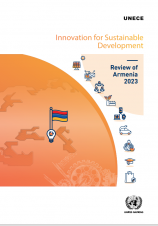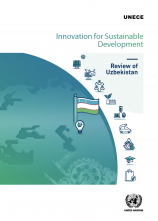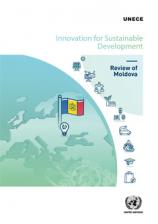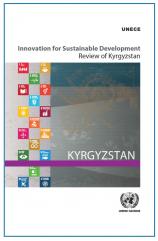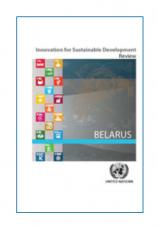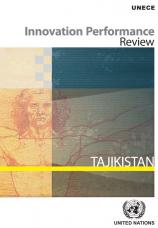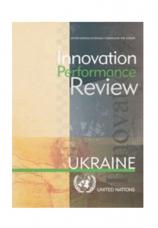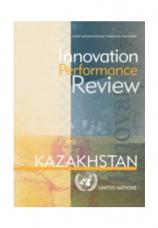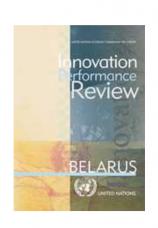What is an I4SDR?
The UNECE Innovation for Sustainable Development Review (I4SDR) provides a solid understanding of the national and regional innovation system through a calibrated assessment and recommendations for policy and structural reform, based on international good practices and a firm understanding of national and regional specificities.
The Review is a result of an in-depth dialogue and consultation among the UNECE Secretariat, leading subject matter experts, Government officials, academia, the private sector, and other innovation stakeholders in the country. UNECE also supports subsequent reform efforts through policy dialogue and capacity building tied to the recommendations and priorities of the report.
Learn more about the I4SDR in this flyer.
I4SDR methodology
The Review looks at three dimensions:
- Overall economic development and innovation performance, based on input and output metrics, outlining the opportunities and challenges that policies related to enabling and promoting innovation should address;
- The national innovation system and innovation governance, analysing how and to which extent public policy and existing intervention mechanisms serve to nurture the innovation system, and address these opportunities and challenges; and
- Selective chapters focusing on the topics of importance to the country, such as science-industry linkages, innovation in specific sectors, innovation-enhancing procurement, start-up support, and diaspora engagement, among others.
Based on this analysis, the Review elaborates recommendations and measures to stimulate innovation activity, enhance innovation capacity among stakeholders, and improve the efficiency of the national innovation system – all conducive to sustainable development.
The Review uses policy analysis and research, multi–stakeholder meetings at national level for fact–finding, awareness raising and consensus building and a peer review.
Following publication, ECE typically supports the country through capacity building and policy dialogue to support return effects. After 3-5 years, at the request of the national authorities, a second review assesses progress and re-evaluates priorities.
Upcoming publications:
Ukraine (To be determined)
Innovation will be vital for the reconstruction of Ukraine's economic and social systems guaranteeing the country's long-term success, resilience and sustainability. Initiated in 2021, the I4SDR of Ukraine was paused due to the ongoing conflict. In late 2022, UNECE renewed its analytical efforts in the country adapting to the current context in the country.
Latest publications:
|
|
Armenia (2023)
Over the past years, Armenia has managed to maintain a competitive information and communication technology (ICT) sector while fostering an energetic entrepreneurial scene. The success of the ICT sector, complemented by robust tourism, mining, food processing, and agriculture sectors, underscores Armenia's innovation potential. However, ensuring sustained economic growth and social development remains a challenge as the old drivers of growth run out of steam. Innovation, a systematic exploration of new ideas, products, and processes, is a central catalyst in overcoming these hurdles and bolstering Armenia's sustainable development.
|
| |
|
|
|
Uzbekistan (2022)
Uzbekistan has made important recent progress in liberalizing its economy for trade and investment, spurring economic growth and creating significant reform momentum for sustainable development and the transition towards a circular economy, in line with United Nations Agenda 2030. Innovation plays an important role in these efforts, as it is essential to building a competitive economy and addressing contemporary challenges, such as environmental sustainability, unemployment, and poverty reduction. Encouraging experimentation and collaboration for innovation and fostering the absorption of new knowledge and technologies will enable new ways to create value and enhance Uzbekistan’s capacity to withstand externally induced shocks such as the COVID-19 pandemic.
|
| |
|
|
|
Moldova (2022)
Since independence, Moldova has navigated the challenging transition to a market economy while achieving significant, albeit volatile, economic growth, reduced poverty levels and the status of a lower-middle-income economy. However, productivity growth has slowed in more recent years. This review takes an in-depth look at the factors, both positive and negative, that have a bearing on innovation-led sustainable development in Moldova and provides tailored recommendations to tap the potential for resilient and inclusive social and economic transformation.
|
| |
|
|
|
Georgia (2021)
Georgia engaged in an impressive array of reforms during the past two decades, turning it into one of the most open, well-governed countries with economies in transition in the UNECE region. The regulatory climate for doing business ranks among the best globally, and Georgia has become a vibrant trade hub, attracting significant investment. This Review takes an in-depth look at the factors that will underpin innovation-led sustainable development in Georgia, identifies strengths to build on, and priorities for reform. Georgia has a tradition of high levels of educational attainment, but skills shortages and mismatches in the labour market constrain private sector innovation.
|
| |
|
|
|
Kyrgyzstan (2019)
With one of the most open economies in the region, an educated workforce, strong legacy of applied research, ample natural resources, and vibrant and growing links with the neighbouring region, Kyrgyzstan is well positioned to benefit from untapped potential for innovation-led, sustainable growth. This review takes an in-depth look at a range of important factors that enable and promote innovation in Kyrgyzstan including innovation performance, the economic structure, and relevant laws, policies, instruments, and institutions, exploring how innovation can contribute not only to long-term economic growth, but also help address pressing social and environmental concerns.
|
| |
|
|
|
Belarus (2017)
Belarus has a notable legacy of world-class scientific research and industrial production, where the Government has reformed its national innovation system in line with UNECE’s recommendations in its first UNECE Innovation Performance Review, launched in 2011. Central reforms include passing legislation to encourage commercialization of intellectual property, centralizing and improving transparency of innovation funds, and including innovation in the overall national strategy for sustainable development. This review covers an assessment of the country’s national development strategy in light of ongoing international initiatives and a review of recent eco-innovation projects in Government programmes and development strategies.
|
| |
|
|
|
Tajikistan (2015)
The Republic of Tajikistan has achieved strong economic and social development over recent years and has made important steps in moving away from a factor-driven to an efficiency-driven model of growth. Innovation will be crucial to moving towards the next level of economic prosperity, and the right policy measures will play a decisive role. This Review provides a set of recommendations to encourage innovation and enhance the effectiveness of public policies. Close collaboration with the national authorities and other experts from Tajikistan has ensured that the final assessment reflects a common understanding of the situation in the country and the validity of the proposed recommendations.
|
| |
|
|
|
Armenia (2014)
To support Armenia’s effort to build a strong national innovation system, the first innovation review of Armenia evaluates the country’s initial progress and identifies several recommendations such as increasing policy attention to non-technological innovation, specifically in services, and facilitating the dissemination of knowledge. Other areas include completing the National Innovation System, strengthening the links between industry and science, simplifying innovation governance mechanisms, promoting innovation in small and medium-sized enterprises, involving the business sector in the development of innovation policy, competitively allocating public support for innovation, and adopting international standards for innovation statistics. The assessment also highlights the importance of leveraging the financial and human potential of the Armenian diaspora and foreign direct investment to drive innovation.
Link: https://unece.org/info/Economic-Cooperation-and-Integration/pub/2107
|
| |
|
|
|
Ukraine (2013)
The assessment of the innovation performance in Ukraine shows that the importance of innovation is recognized in many legal and policy documents, including at the highest level. However, a holistic consideration of the National Innovation System (NIS), its various components and the relations between them, remains lacking. The recommendations include an integrated consideration of the various components of the NIS, to identify weak elements and emphasize linkages between different subsystems as important policy targets. As part of coordinated action to improve the framework conditions for innovation, the authorities should strengthen their efforts to encourage the development of an innovation culture, in particular through awareness, dissemination and communication initiatives.
|
| |
|
|
|
Kazakhstan (2012)
Kazakhstan embraced international cooperation to gain access to new knowledge, identify good policy practices and develop contacts that should result in improved innovation performance. To strengthen the National Innovation System (NIS), the Review recommends further efforts to strengthen the connectivity between various components of the NIS through horizontal instruments that facilitate linkages, including public support to coordination and risk-sharing mechanisms. Other recommendations and policy options aim to stimulate innovation activity in Kazakhstan, enhance its innovation capacity and improve the overall efficiency of the national innovation system.
|
| |
|
|
|
Belarus (2011)
There has been broad awareness and recognition of the importance of innovation for future growth and competitiveness of Belarus. The Review aims to contribute to the existing body of policy-relevant analytical work on policies promoting innovative development, thus facilitating the further identification of good practices in Belarus. The recommendations focus on improving the functioning of the National Innovation System (NIS) with a clear allocation of intellectual property rights, additionally suggesting encouraged innovation activity and facilitated industry-science linkages.
|
| |
|
